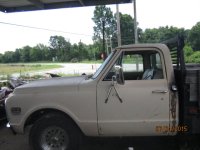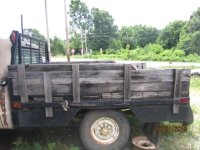Complete Turf Care
Veteran Member
- Joined
- Mar 31, 2013
- Messages
- 2,013
- Location
- South Louisiana
- Tractor
- 2022 Kubota Grand L6060 (no loader), 2017 Kubota Grand L6060, 2011 Kubota L5740 HSTC-3, 1997 Kubota M4700
I drove semi for years. and I now use a 3/4 ton. In Arkansas a ton truck comes under the DOT. you better have a health card , log book and load manifest. and be able to scale on every axle. with a 3/4 ton none of that is required. and the only weight limit is what is on the sidewall of your tires. I use split rims and 14 ply lowboy tires on my trailer. 3,750 pounds. per tire that's 15,000 on the 4 trailer tires and the truck will have some weight on it also.
From what I understand, each state is different. I did a little research for here in Louisiana, and this is what I found. It looks like a 'chauffeur's licence' is required for this vehicle as long as the combined GVWR stays below 26,001 lbs. A 'chauffeur's license' (in Louisiana) does not require the pre-trip inspection and all the other things required of a CDL. My trailer has a GVWR of 11,000 lbs and this truck has a GVWR of 13,000 lbs., therefore in Louisiana, a CDL is not required.
R.S. 32:408 B.(2)(d) and 405.1:
Class "D" Chauffeurs Driver's License
Age Requirements: 17 years or above.
Permits the operation of all vehicles included in Class "E" plus any single motor vehicle
used in commerce to transport passengers or property if the motor vehicle has a gross
vehicle weight rating of 10,001 or more pounds but less than 26,001 pounds, or any
combination of vehicles used in commerce to transport passengers or property if the
vehicle has a combined vehicle weight rating of 10,001 or more pounds but less than
26,001 pounds inclusive of a towed unit with a gross vehicle weight rating of more than
10,000 pounds; or any vehicle designed or utilized for the transportation of passengers for
hire or fee; and not utilized in the transportation of materials found to be hazardous under
the provisions of the Hazardous Materials Transportation Act which requires the vehicle to
bear a placard under the provision of Hazardous Materials Regulations (49 CFR Part 172,
Subpart F).
i


